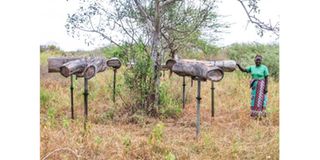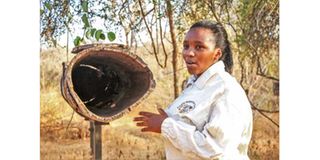Kitui women tear down cultural barrier to beekeeping

Elizabeth Munywoki shows some of her beehives in Mukuanima village, Kitui County. She is among the biggest producers and marketers of honey in the region.
What you need to know:
- Today, things have changed; a spot check in Kitui South shows that most homesteads have at least three beehives, and women are among the keepers.
- Local bee farmers have benefitted from state-of-the-art processing equipment donated by Dorcas Aid, an NGO that promotes sustainable livelihoods and training to enhance production.
As women marked this year's International Women's Day, Elizabeth Munywoki received special beehives from a local cooperative to boost her honey production enterprise. She is among a growing community of women in Kitui County who have shunned cultural stereotypes and embraced beekeeping.
"The 11 catcher boxes will go a long way in boosting our production by ensuring that our 42 beehives are colonised throughout the year," the mother of four says, referring to the special beehives used to trap and transport bees for stocking mainstream hives.
Although beekeeping is a major economic activity in the arid region, traditions and the use of ancient techniques have, for years, made it the preserve of ikuli, the local industry parlance for old men from particular lineages with a history of beekeeping. Today, things have changed. A spot check in Kitui South shows that most homesteads have at least three beehives, and women are among the keepers.
In the sleepy Mukuanina village on the Yatta Plateau, Ms Munywoki is the poster child of the honey revolution. She stands out because she does the harvesting herself in an area that, until recently, was a no go zone for women.
She had earned Sh30,000 a week ago from selling 120kg of honey to Kamaki Farmers’ Cooperative Society, Ms Munywoki tells Nation.Africa when we visit her apiary.
“Beekeeping is now our economic mainstay as growing maize and peas has not been sustainable because of erratic weather. We earn about five times more from selling honey than from farming our two acres," she says.
Ms Munywoki's story is replicated across the arid county. Hundreds of women have adopted beekeeping. On the southern side of the county, four in every 10 beekeepers are women, according to Esther Mutunga, the manager at Kamaki Farmers’ Cooperative Society, which brings together more than 4,500 beekeepers.

Esther Mutunga, a beekeeper and manager at Kamaki Farmers’s Cooperative Society, shows a traditional beehive in Muangeni village, Kitui County. The society brings together more than 4,500 beekeepers in the arid region.
Modern methods
The society started in 2008 as a small community-based organisation. Today, it exclusively promotes beekeeping through modern methods. It buys harvests from farmers, processes and packages them in clean branded containers ready for the market.
“Since time immemorial, women in this region shied from beekeeping because the industry was associated with men. Some people even believed that when a woman visits an apiary, the husband dies. These cultural stereotypes, coupled with the traditional ways of setting up beehives on top of tall trees, kept women away from apiaries. Then men would dress down when harvesting honey ostensibly to minimise attacks by bees,” she says.
Ms Mutunga notes that women worry no more about risks associated with harvesting honey. Modern beehives enable them to harvest without having to scale tall trees and guarantee them increased production of high-quality honey.
Local bee farmers have benefitted from state-of-the-art processing equipment donated by Dorcas Aid, an NGO that promotes sustainable livelihoods and training to enhance production.
"We buy honey at Sh250 and pay the farmers promptly. We discourage them from pounding raw honey as this decreases its quality," says Ms Mutunga, who is also a beekeeper.
Benchmarking destination
The group has been a benchmarking destination for budding beekeepers and has inspired farmers across the region.
They include Kavalo Youth Group, a group of 14 women in Kitui Central who came together seven years ago. The county government seeded their beekeeping entrepreneurship by donating 10 Langstroth beehives and sets of harvesting kits. The business expanded last year when they received 10 more modern beehives and more sets of harvesting kits from the National Agricultural and Rural Inclusive Growth Project (NARIGP). Today, the group stands out among the most vibrant beekeepers in the region.
Kitui Agriculture executive Emmanuel Kisangau boasts of at least 10,000 beekeepers in the region.
“Although society is still coming to terms with female ikuli, men still look at us in awe every time we head to the apiary. We are glad we are changing the perception that women should not keep bees,” says Esther Kyalo, the group chairperson.
“It is regrettable that cultural stereotypes had for years locked women out of an entire source of nutrition and livelihood.”
Harvests
When there is sufficient rain, Kitui beekeepers harvest honey thrice a year. A single beehive produces between 10 and 15 kilogrammes of raw honey.
“The biggest challenge honey production faces is drought. During dry spells, we take turns to draw water for the bees and incur expenses of making available sugary solution next to the hives so that the bees do not migrate,” Ms Kyalo says.
The beekeepers use word of mouth and social media to market the produce. A kilogramme fetches between Sh700 and Sh1,000.
The biggest headache among beekeepers, according to Ms Munywoki, Ms Kyalo and Ms Mutunga, is its inability to meet the growing demand for authentic honey.
Advocacy by nutritionists on the need for safe sugar, which is contained in pure honey, has caused a surge in demand.
Governor Charity Ngilu’s administration provides the biggest market for the honey produced across Kitui. Honey is the main ingredient for a special wine, which the county government produces.
“Kitui produces the best honey in the world. We have invested in bee keeping and introduced value addition on products to increase earnings for our beekeepers," Ms Ngilu said during last year's World Bee Day celebrations held in Kitui town.




